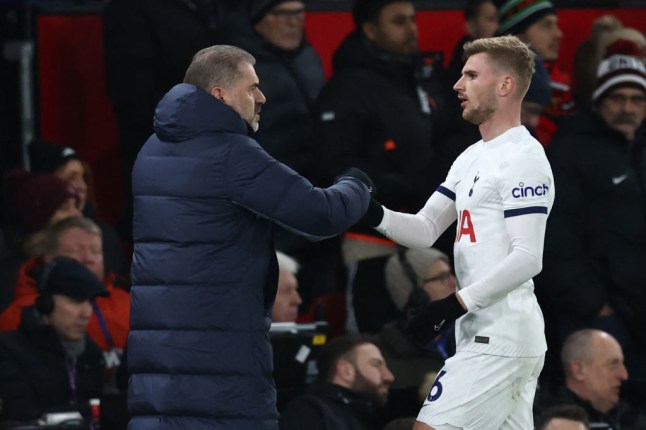Timo Werner’s footballing journey has reached a critical impasse, with neither Tottenham Hotspur nor RB Leipzig showing enthusiasm to retain the German international’s services beyond this season.
The 29-year-old forward, once regarded as one of Europe’s most lethal attackers during his first spell at Leipzig, now finds himself in career limbo after two underwhelming loan spells in North London.
Werner’s initial six-month loan to Tottenham in January 2023 showed glimpses of promise, enough for Spurs to extend his stay for the current campaign. However, any optimism surrounding the former Chelsea man has evaporated during a disastrous season for both player and club.
The statistics paint a damning picture of his decline – no Premier League goals in 18 appearances and just a solitary strike across 21 total outings. These barren numbers make Tottenham’s £8.5 million purchase option appear increasingly unlikely to be activated.
RB Leipzig sporting director Marcel Schafer’s recent comments to RB Live effectively sounded the death knell for Werner’s potential return to Saxony. “The loan isn’t going quite as well as we might hope,” Schafer admitted before hinting at sweeping changes.

“We need a breath of fresh air, a new spirit, to recapture that attitude, that life, brutal energy that has distinguished this club.” These carefully chosen words suggest Werner no longer fits the profile of player Leipzig envisions for their future.
The situation has deteriorated to such an extent that Werner has become emblematic of Tottenham’s broader struggles under Ange Postecoglou. Despite Spurs’ well-documented injury crisis, the German has started just four Premier League matches, with his manager delivering several public rebukes that laid bare the growing frustration.
Postecoglou’s explosive comments after December’s Europa League draw with Rangers revealed the depth of Werner’s fall from grace. “When you’ve got 18-year-olds in the team, it’s not acceptable to me,” the Australian fumed after substituting Werner at halftime. “He’s a German international.
In the moment we’re in right now, I need everyone to at least be going out there and trying to give the best of themselves. His performance in the first half wasn’t acceptable.”
These blistering assessments continued during a Friday press conference where Postecoglou doubled down on his demands. “We’re in a fight here. I’m not going to go around worrying about bruised egos,” he stated, delivering what many interpreted as a thinly-veiled ultimatum to underperforming senior players like Werner. “If someone is fit and able to contribute and someone who feels they need a bit extra [motivation], they are probably not the right person.”
The contrast between Werner’s current predicament and his peak years at Leipzig could hardly be starker. During his most prolific Bundesliga season (2019/20), the striker netted 28 goals in 34 appearances, earning him a £47.5 million move to Chelsea.
Now, just four years later, he struggles to command regular minutes for a mid-table Premier League side.
Several factors have contributed to this dramatic decline:
- Confidence Crisis: Werner’s finishing has deteriorated markedly since his Chelsea struggles
- Tactical Misfit: Neither Leipzig’s current system nor Postecoglou’s demands suit his strengths
- Physical Decline: The explosive acceleration that defined his game has noticeably diminished
- Mental Fragility: Public criticism appears to have exacerbated rather than motivated him
As the summer transfer window approaches, Werner faces perhaps the most challenging crossroads of his career. At 29, he should be entering his prime years, yet instead confronts the prospect of becoming footballing nomad – too expensive for mid-table clubs given his wages, yet no longer trusted by elite sides.
Potential destinations might include a return to the Bundesliga with a team like Wolfsburg or Hoffenheim, or perhaps a move to Serie A where the slightly slower pace could help rebuild his confidence.
MLS clubs may also view him as a potential marquee signing should European options dry up.
Werner’s predicament serves as a cautionary tale about how quickly fortunes can change in modern football. From Champions League semifinalist to unwanted loanee in just three seasons, his story highlights the fine margins between success and obsolescence at the highest level.
Wherever he lands next, the coming months will determine whether this is merely a career slump or the beginning of an irreversible decline for a player who once promised so much.
